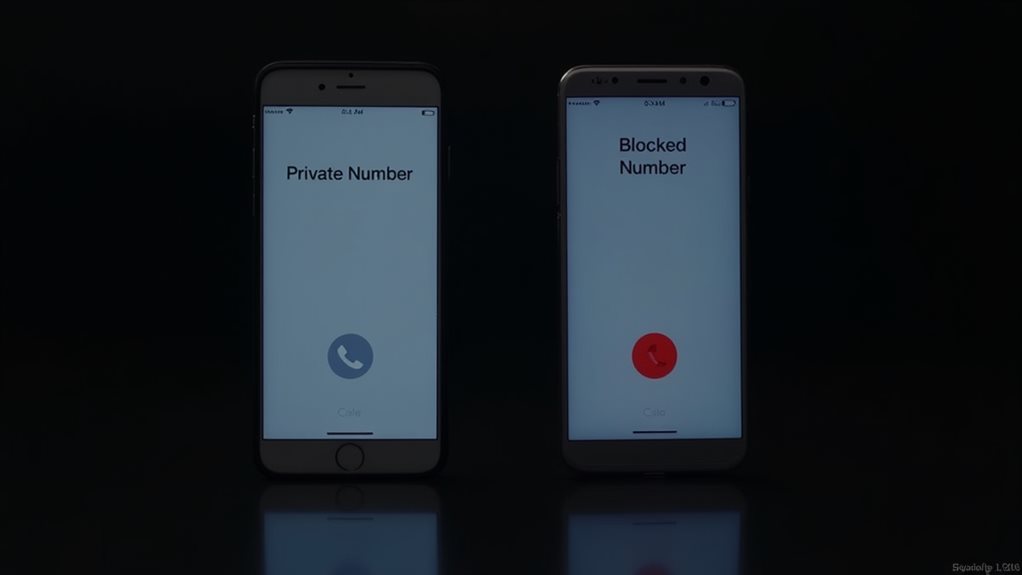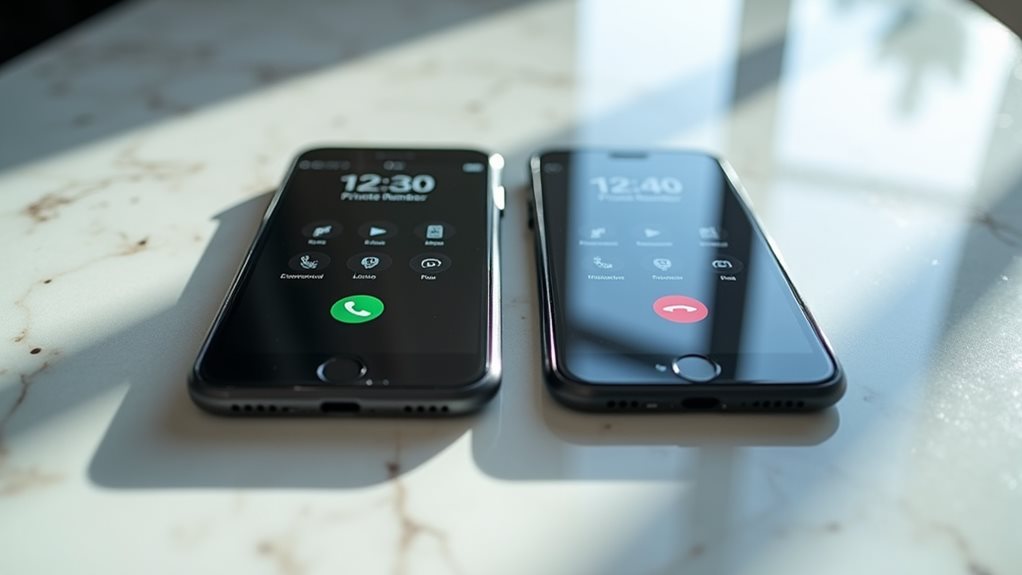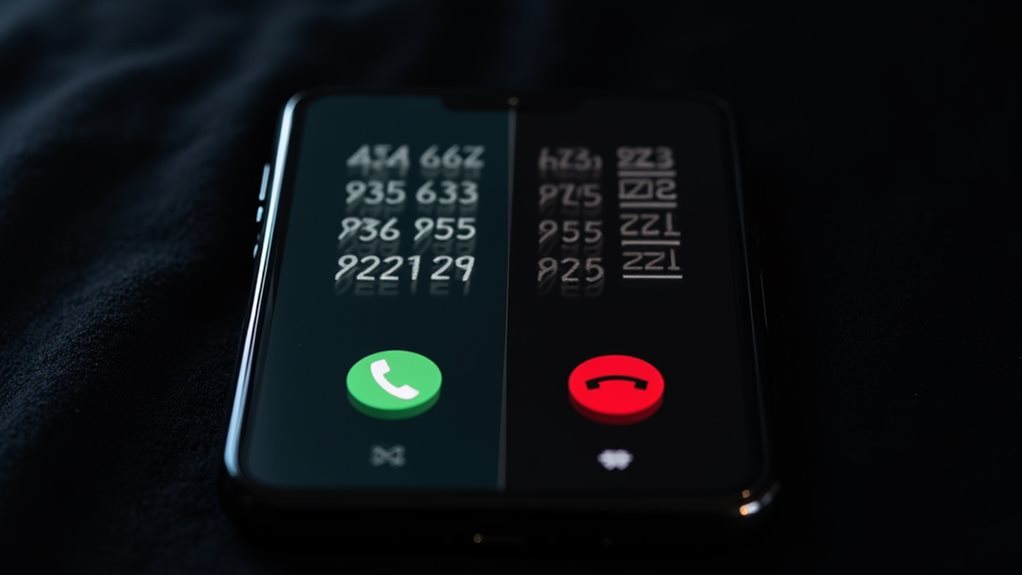When you encounter private and blocked numbers, you're dealing with two distinct calling features. Private numbers allow callers to hide their identity when making outgoing calls, typically displaying as "Private" or "Unknown" on the recipient's screen. In contrast, blocked numbers represent your active choice to prevent specific contacts from reaching you, effectively stopping their calls and texts from coming through. Understanding these differences helps you better manage your phone's security features and maintain control over your communications.
Understanding Private Numbers: What They Are and How They Work
While many people receive calls daily, understanding private numbers has become increasingly important in today's privacy-conscious world. When you're dealing with private number usage, you'll notice that these calls appear as "Private," "Blocked," or "Unknown" on your device due to the caller deliberately hiding their information through caller ID functionality. Call tracing services can be activated by dialing *57 after receiving concerning private calls.
You can make your own calls private either temporarily by using specific codes (like *67 in the US) or permanently through your service provider. Some telemarketers and scammers take advantage of private numbers to evade call blocking. Furthermore, understanding the legal implications of VoIP call tracing is vital for ensuring that such calls can be monitored if necessary.
Many professionals, such as doctors and lawyers, rely on private numbers to maintain client confidentiality. You'll find that private numbers serve legitimate purposes, from protecting personal information to managing professional communications effectively.
Whether you're a business owner protecting sensitive information or an individual valuing privacy, understanding private numbers helps you navigate modern communication needs.
Exploring Blocked Numbers: Features and Implementation
In contrast to private numbers, blocked numbers represent a more permanent solution for managing unwanted communications on your device.
When you're looking to take control of your incoming calls and messages, blocked number features offer extensive protection across all your communication apps. Recipients typically see a busy or unavailable message when attempting to reach your number.
The implementation details make this system particularly effective, as your blocked numbers list stays with you even when you switch devices or apps. The system provides out-of-the-box functionality that ensures blocking features work immediately upon device setup.
You'll find that once you've blocked a number, it's restricted at the system level, meaning you won't receive calls or texts from that contact through any app.
Your phone's default dialer and messaging apps work seamlessly with this blocking system, and you can easily manage your blocked list through a user-friendly interface that shows you exactly who you've restricted.
Key Distinctions Between Private and Blocked Calls

Understanding the distinctions between private and blocked calls helps you navigate modern communication challenges with confidence.
When you're dealing with caller privacy, it's important to recognize that private numbers use specific codes like *67 to conceal identity, while blocked numbers rely on device or carrier settings for network security. Most professional business callers may hide their numbers for legitimate privacy reasons when contacting clients. Therapists and counselors often use restricted numbers to maintain client confidentiality.
You'll notice different displays on your phone depending on the type of hidden number. Private calls often show up as "Private" or "No Caller ID," indicating the caller's deliberate choice to remain anonymous.
Blocked numbers display similarly but result from carrier-level restrictions. If you see "Unknown Caller," it's typically due to technical issues rather than intentional hiding.
Knowing these differences helps you make informed decisions about which calls to answer and how to manage your own caller ID settings.
Methods to Enable Private Numbers and Call Blocking
Now that you're familiar with the differences between private and blocked calls, you'll want to know exactly how to implement these privacy features on your devices.
Your private number settings can be activated in several ways, depending on your device and location. On Android phones, access your Phone app settings and adjust the Caller ID options. For iPhones, simply toggle the "Show My Caller ID" switch in your Phone settings. If you're using a landline, *67 works in North America, while #31# is effective in Europe and Australia. Using a private number can enhance your security by reducing account hacking risks and ensuring safer interactions.
Statistics show that 67% of Americans avoid answering calls from private or unknown numbers, making these privacy features particularly relevant for those who still want their calls to get through.
For call blocking techniques, you've got multiple options at your disposal. Regular maintenance of your blocked numbers helps ensure optimal filtering performance. Non-VoIP US numbers are also an effective way to protect your privacy and prevent unwanted calls.
You can manually block numbers through your device settings, utilize your carrier's blocking services, or invest in third-party apps that offer advanced filtering capabilities and community-based spam protection.
Best Practices for Managing Private and Blocked Calls

Managing private and blocked calls effectively requires three essential strategies that'll help protect your privacy and minimize unwanted interruptions.
First, implement robust call screening by utilizing your phone's built-in blocking features and third-party apps to filter unwanted calls. This is especially important because VoIP fraud schemes often exploit vulnerabilities in call systems.
Second, enhance your privacy protection by registering your number on the Do Not Call Registry and regularly updating your blocked number list.
Finally, establish a systematic approach to handling unknown calls by letting them go to voicemail and requiring callers to identify themselves.
Active listening during voicemail review helps determine if callbacks are necessary for legitimate callers.
You're not alone in dealing with unwanted calls, and these practices will help you maintain control over your phone communications.
Consider using services like KrispCall's features to manage suspicious calls through call holding, forwarding, and comprehensive blocking capabilities.
Remember to report suspicious calls to the FTC and keep your phone's software updated to guarantee you have access to the latest security features.
Frequently Asked Questions
Can Emergency Services Trace Calls From Private Numbers?
Yes, if you're calling emergency services, they can trace your private call. Your emergency call's tracing happens automatically, even with a private caller ID, ensuring help reaches you when you need it.
Do Private Numbers Still Work When Calling International Phone Numbers?
Yes, you'll find that private numbers work perfectly for international dialing. You can maintain your privacy concerns while making calls worldwide, just like other users who rely on private numbers for global communication.
Will Blocked Callers Know When Their Voicemails Are Listened To?
No, you can rest assured that blocked callers won't know when you listen to their voicemails. The voicemail system doesn't send any notifications back to them, protecting your privacy while maintaining their caller anonymity.
Can Private Numbers Bypass Carrier-Level Blocking Systems?
Yes, private calls can often bypass carrier-level blocks since they mask caller anonymity. You'll find these calls harder to screen because blocking systems typically rely on identifying visible numbers rather than hidden ones.
Do Phone Companies Charge Extra Fees for Permanent Number Blocking Services?
You won't pay extra for basic number blocking, as permanent blocking fees aren't allowed under standard number blocking regulations. Most carriers include this service for free, and you're entitled to these basic protections.
Final Thoughts
You've now learned the vital differences between private and blocked numbers, each serving distinct purposes in managing your calls. While private numbers mask your identity for outgoing calls, blocked numbers prevent unwanted incoming communications. Whether you're protecting your privacy or managing unwanted contacts, you can confidently use these features to maintain control over your phone communications while staying within legal and ethical boundaries.

